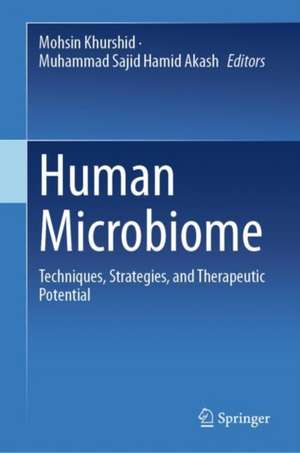Human Microbiome: Techniques, Strategies, and Therapeutic Potential
Editat de Mohsin Khurshid, Muhammad Sajid Hamid Akashen Limba Engleză Hardback – 12 sep 2024
Preț: 1630.60 lei
Preț vechi: 1716.41 lei
-5% Nou
Puncte Express: 2446
Preț estimativ în valută:
312.03€ • 333.65$ • 260.15£
312.03€ • 333.65$ • 260.15£
Carte tipărită la comandă
Livrare economică 17 aprilie-01 mai
Preluare comenzi: 021 569.72.76
Specificații
ISBN-13: 9789819737895
ISBN-10: 9819737893
Pagini: 300
Ilustrații: Approx. 300 p. 70 illus., 40 illus. in color.
Dimensiuni: 155 x 235 mm
Greutate: 1.2 kg
Ediția:2024
Editura: Springer Nature Singapore
Colecția Springer
Locul publicării:Singapore, Singapore
ISBN-10: 9819737893
Pagini: 300
Ilustrații: Approx. 300 p. 70 illus., 40 illus. in color.
Dimensiuni: 155 x 235 mm
Greutate: 1.2 kg
Ediția:2024
Editura: Springer Nature Singapore
Colecția Springer
Locul publicării:Singapore, Singapore
Cuprins
Chapter 1. An Introduction to the Human Microbiome.- Chapter 2. Host-microbiome Interactions.- Chapter 3. Techniques for Studying the Microbiome.- Chapter 4. Role of Computational Biology in Microbiome Research.- Chapter 5. The Epigenetic Impact of the Human Microbiota on Host Cells.- Chapter 6. Unraveling the Complexity of the Skin Microbiome: Advancing Research through Optimal Biological Models.- Chapter 7. Oral microbiome and its implication on systemic diseases.- Chapter 8. Microbiome and Reproductive Health.- Chapter 9. Microbiome and Neurological Disorders.- Chapter 10. Microbiome and Circadian Rhythms: Implications for Sleep, Aging and Therapeutic Strategies.- Chapter 11. Microbiome-Based Therapeutics in Immunological Disorders.- Chapter 12. Microbiome-based treatment for Gastrointestinal tract disorders.- Chapter 13. Microbiome-Targeted Therapies: Enhancing Resilience in Metabolic Disorders.- Chapter 14. Microbiome-Based Therapeutics for the Management of Cancer.- Chapter 15. Microbiome Based Therapies for Mental Health Disorders.- Chapter 16. Transforming Infection Treatment with Microbiome-Based Therapeutics.- Chapter 17. Microbiome-based formulations and products and their therapeutic implications.- Chapter 18. Strategies for modulating the gut microbiome.- Chapter 19. Modulating the Human Microbiome: The Impact of Xenobiotics on Gut Microbial Composition and Therapeutic Strategies.- Chapter 20. Building a Better Microbiome: Advances in Microbiome Engineering for Human Health.- Chapter 21. Regulatory considerations for Microbiome-based therapeutics.- Chapter 22. Microbiota-Based Therapeutics for COVID-19 and sequelae.
Notă biografică
Dr. Mohsin Khurshid is an Associate Professor of Microbiology and Infectious Diseases at the Institute of Microbiology at Government College University Faisalabad, Pakistan. He has also served as a faculty member at King Saud University in Riyadh, Saudi Arabia, and as a visiting researcher at the Institute of Antibiotics at Fudan University, Shanghai, China. Dr. Khurshid's research focuses on microbial pathogenesis, antimicrobial resistance, and gut microbiota. He has dedicated his career to understanding the potential of microbiome and probiotics in combating AMR and other infectious and non-communicable diseases. He has published more than 130 articles in top-tier scientific journals and 18 book chapters in various books. Dr. Khurshid has served as a referee for numerous international journals, including Briefings in Bioinformatics, Frontiers in Microbiology, Cancer Letters, Expert Review of Anti-infective Therapy, Microbial Ecology, and Lancet. He is a sought-after speaker at conferences and symposiums worldwide. His active involvement in various professional organizations and editorial boards of prestigious scientific journals has established him as a prominent figure in the field of microbiology and infectious diseases.
Dr. Muhammad Sajid Hamid Akash is currently an Associate Professor at the Department of Pharmaceutical Chemistry, Government College University Faisalabad (GCUF), Pakistan. He received his bachelor's and master's degrees in pharmacy from Bahauddin Zakariya University Multan, Pakistan, and his Ph.D. in Pharmaceutical Analysis from Zhejiang University, China. His current research focuses on investigating the impact of environmental contaminants (ECs) on various molecular and metabolic pathways involved in cardiometabolic disorders and developing corresponding treatment strategies. His cutting-edge research work is of significant value to developing countries like Pakistan, where it can be most effective and cost-efficient, particularly for diabetic patients. He has published 180 research articles in peer-reviewed journals, 60 book chapters, and six books. Dr. Akash also serves as an Associate Editor \ Academic Editor and Review Editor for several international journals. He has also served as a Guest Editor for three special issues in Metabolites, Frontiers in Toxicology, and BIOCELL journals. Based on his contributions to medical and health sciences, Dr. Akash has received several awards, including the PAS Gold Medal in Health Sciences from the Pakistan Academy of Sciences, the PROF AR Shakoor Gold Medal in Biological Sciences from the Zoological Society of Pakistan, and the Productive Scientist of Pakistan award from the Pakistan Council for Science and Technology.
Dr. Muhammad Sajid Hamid Akash is currently an Associate Professor at the Department of Pharmaceutical Chemistry, Government College University Faisalabad (GCUF), Pakistan. He received his bachelor's and master's degrees in pharmacy from Bahauddin Zakariya University Multan, Pakistan, and his Ph.D. in Pharmaceutical Analysis from Zhejiang University, China. His current research focuses on investigating the impact of environmental contaminants (ECs) on various molecular and metabolic pathways involved in cardiometabolic disorders and developing corresponding treatment strategies. His cutting-edge research work is of significant value to developing countries like Pakistan, where it can be most effective and cost-efficient, particularly for diabetic patients. He has published 180 research articles in peer-reviewed journals, 60 book chapters, and six books. Dr. Akash also serves as an Associate Editor \ Academic Editor and Review Editor for several international journals. He has also served as a Guest Editor for three special issues in Metabolites, Frontiers in Toxicology, and BIOCELL journals. Based on his contributions to medical and health sciences, Dr. Akash has received several awards, including the PAS Gold Medal in Health Sciences from the Pakistan Academy of Sciences, the PROF AR Shakoor Gold Medal in Biological Sciences from the Zoological Society of Pakistan, and the Productive Scientist of Pakistan award from the Pakistan Council for Science and Technology.
Caracteristici
Provides exhaustive coverage of host-microbiome interaction and its impact on health and disease Introduces techniques and computational approaches for studying the human microbiome Elucidates regulatory considerations and ethical considerations in the field of microbiome-based therapeutics
